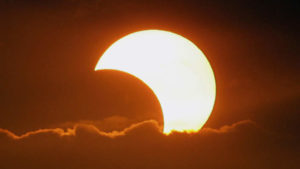 Like many Americans, this past Monday I gathered with others outside to experience the eclipse.
Like many Americans, this past Monday I gathered with others outside to experience the eclipse.
Where I live, we only had about a 75% eclipse, but it was still interesting to watch it get semi-dark in the middle of any otherwise sunny day.
As you know if you have been following this blog, three weeks ago, The Wife and I returned from our Reformation Tour in Prague and Germany.
While there, I had started reading the letters of Jan Hus. While I was on the treadmill yesterday I was getting toward the end of his letters and came to the point in his life where he was jailed in Constance, Germany and was getting ready to make his first defense before Sigismund, King of Germany, just a month before he would be burned at the stake. In introducing the letter Hus wrote that day, the editor mentioned that:
“On the 7th Hus was again brought before the Council. The friary was surrounded by the town guard, and at an early hour the Council assembled for Mass. While this ritual was proceeding the sun was eclipsed, to the consternation of all. An hour later, about 8 A.M., Hus was brought before before the court.”
That’s interesting I thought, given all the media coverage about this weeks’ eclipse. So, I hopped on the internet and Googled, “solar eclipse in the year 1415.” Sure enough, there it was, a total solar eclipse had occurred on June 7, 1415. I then found a chart that showed the path of the eclipse, and it went right over Germany! Apparently, it was one of the longer total solar eclipses. lasting 4 minutes and 51 seconds.
When asked by his disciples when the temple would be destroyed, Jesus said it would happen within a generation (40 years) and that immediately before it happened the sun would be darkened and “the moon will not give its light.” Matthew 24:29. Jesus was citing Old Testament prophetic language that essentially God would turn out the lights on the Israel and the temple. See e.g. Isaiah 13:10. Sure enough there was lunar eclipse that occurred on April 14, 70 A.D. the same day Titus began his siege against Jerusalem that resulted in its destruction. The temple has never been rebuilt and and Jews were taken into slavery and scattered throughout the world as a result.
Of course, we know that eclipses do not happen randomly or arbitrarily, but according to schedules. This means that God did not orchestrate the eclipses so much as He orchestrated history to occur at a time when eclipses would give warning or have meaning, which is pretty impressive.
So, back to our hero, Jan Hus. I suppose the papists could have interpreted the solar eclipse of June 7, 1415 over Germany as a sign of judgment against Hus, but I think that unlikely. If the judgment of individuals merited astronomical events there would have to be so many they would be meaningless. Such events were reserved for nations, the church, and major historical events. Here, it was a warning of impending judgment on a corrupt Catholic Church that would in a month burn a man at the stake who had been sent by God to speak truth to them. Fifty years later, and Rome still having not heeded the warning of Hus, the Reformation would begin in full force.
So, what of eclipses today? Are they still a sign of judgment? I’m not so sure. Now that we know they occur in regular intervals my guess is the Lord uses unpredictable natural events, such as hurricanes, to get our attention, but that is just a guess. GS
